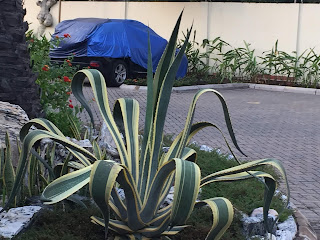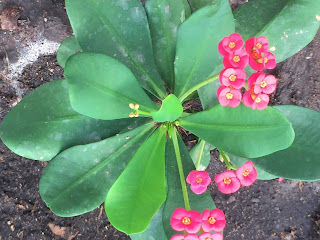We have now been in Accra two weeks. Last week was much less chaotic and we are starting to feel the rhythm of life here. We got our truck and Elder Emfield started driving. I have not been brave enough yet to drive but it takes two sets of eyes to try and stay safe, so I am the official navigator. We have to be aware of so much going on around us as we drive. Motorcycles drive wherever they want, and that includes between lanes, darting in and out of cars, sidewalks, both against and with traffic, etc. They do not have to obey traffic rules and can run stoplights, etc. They constantly honk so you know they are there. Tro tros are their public transportation. They are little vans (usually in very poor condition) that have a yellow line painted around the lower sides. They pack them with people and get paid by how many people they carry. Therefore, nothing is more important to them than being able to get to more people to transport. They will do whatever it takes to do that. That means they do not follow any traffic rules and will force their way in between you and the next car and you had better move. Traffic is very heavy. Bicycles are also common. At the lights, which are very long, people come into the streets selling everything you can imagine. We have seen all sorts of food, belts, jump ropes, windshield wipers (which they install on site), yoga pants, CDs, toilet paper, watches, car mats, etc. If they can carry it, you can find it on the street. There are also a lot of people begging and many are blind or crippled, sometimes sitting on little scooter boards low on the ground. It is very hard to see everything and make sure you don't injure them, yourself or your vehicle. We are glad we have a truck so we are sitting up higher and are more able to see. I will post pictures of this as soon as I can take some. Right now, I don't dare take my eyes off the road to help watch for anything we could run into.
I am finding that my calls involve both mental and physical health so consult often with the AMA (Area Medical Adviser). Often medical issues are emotionally driven, but I am also finding that with a lot of the Africans, the mental health is often driven by an underlying untreated physical problem. So many of our missionaries are in countries out in the bush and away from any contact with medical help, so we call the Mission Presidents and get them into the Mission Home and whatever interventions are needed. Liberia and Sierra Leone are especially that way. We all rely on each other to stay in contact with them and pull together as a team to keep them safe. Of course, without the Spirit, we would often miss these problems, especially when dealing by phone.
Elder Emfield got his assignment on Friday. He will be working on a counsel with the Global Education Initiative. What exactly that entails is yet to be seen. He will learn more this week. The Church is trying to make education more easily accessible to everyone. However, they have found that building schools and taking children to them is not the best way. They are trying to keep the children home with their families and bring education to them. Ghana is a pilot program for this. Many of the children here leave home and go to boarding school to get an education. Most of the education is learning by rote, not critical thinking which puts the children at a disadvantage if they don't learn those skills. It also separates them from their families. The Church is growing here, but most of the missionaries from this area come from those who are baptized when they are in their late teens, early twenties. The children who are "raised in the church" really haven't been in much contact with the Church or their families much, so they fall away and lack understanding of the teachings. Their families have very little influence in their lives. Hopefully, this will help families educate their children and help the children develop good thinking and leadership skills. Local people are in charge of the program here, but in counsel with others, so it will still meet the needs of the local people and not be a "we outsiders know best" kind of program.
We lost power for about 24 hours this past week. That meant no lights, no air conditioning, no internet, no hot water and no filtered water. We have to filter our water or drink bottled water here. The regular water is so unsanitary we cannot even brush our teeth with it. We are told not to even keep the toothbrush where regular water can splash on it or we could get very sick. The power goes out a lot here. One of the elders told me there is a Chi word for power outage - dumos. This means off/on because that happens so much. When I went to church in the Anyaa ward last week, the power was off for the first 30 minutes. It was nice when then fans came back on to move the air.
We went to church in the Cantonments Ward today because we haven't been assigned a ward here yet. It's much like things in the States. When it came time for testimonies, the members were reminded to bear a testimony, not tell stories etc. and that there were other platforms where those stories could be shared. The members rush to the stand and there isn't a pause until the time to end. Their testimonies are very basic and pure. It is wonderful! One difference we noted was that while we attended in the US, we rarely saw General Authorities. Today we attended with two General Authority Seventies and two Area Authority Seventies. It has been so nice to get to know them and see that they are real people, just like the rest of us. Elder Nash is the Area President and we have enjoyed getting to know him. He and Elder Emfield have really hit it off talking history. Elder Martinez is the person I report to. His wife is very sweet and offered to take me to Market (sort of like a big craft fair) with her when it comes next month because I couldn't remember how to get there yesterday. We have met Elder Dube and have a meeting with him on Thursday. We are working together with LDS Family Services to coordinate Mental Health Resources and establish a hotline that can be reached 24/7 to help people contact mental health services. There is no line or status here between callings in the Church. We are all just here trying to bring people to Christ and each have our own role in it.
The people here are very easy to love. They are very friendly and welcoming. When they find you are new here, they always say "You are welcome." It is a greeting often used for newcomers.
We are loving our time here and are looking forward to growing and learning from the opportunities and people we are surrounded with.
Sister Emfield


















